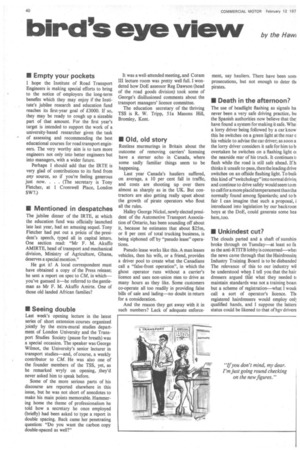bird's eye view by the Halm
Page 42

If you've noticed an error in this article please click here to report it so we can fix it.
• Empty your pockets
I hope the Institute of Road Transport Engineers is making special efforts to bring to the notice of employers the long-term benefits which they may enjoy if the Institute's jubilee research and education fund reaches its first-year goal of £3000. If so, they may be ready to cough up a sizeable part of that amount. For the first year's target is intended to support the work of a university-based researcher given the task of assessing and recommending the best educational courses for road transport engineers. The very worthy aim is to turn more engineers not only into better engineers but into managers, with a wider future.
Perhaps I should add that the IRTE is very glad of contributions to its fund from any source, so if you're feeling generous just now. . . . (The secretary is Tony Fletcher, at 1 Cromwell Place, London SW7.)
• Mentioned in despatches
The jubilee dinner of the IRTE, at which the education fund was officially launched late last year, had an amusing sequel. Tony Fletcher had put out a precis of the president's speech, typed all in capital letters. One section read: "Mr F. M. Akuffo AMIRTE, head of transport and mechanical division, Ministry of Agriculture, Ghana, deserves a special mention."
He got it! A local correspondent must have obtained a copy of the Press release; he sent a report on spec to CM, in which— you've guessed it—he referred to the gentleman as Mr F. M. Akuffo Amirte. One of those old landed African families?
• Seeing double
Last week's opening lecture in the latest series of short extension courses organized jointly by the extra-mural studies department of London University and the Transport Studies Society (pause for breath) was a special occasion. The speaker was George Wilmot, the University's senior lecturer in transport studies—and, of course, a weekly contributor to CM. He was also one of the founder members of the TSS, yet, as he remarked wryly on opening, ,they'd never asked him to speak before.
Some of the more serious parts of his discourse are reported elsewhere in this issue, but he was not short of anecdotes to make his main points memorable. Hammering home the theme of professionalism he told how a secretary he once employed (briefly) had been asked to type a report in double spacing. Back came her penetrating question: "Do you want the carbon copy double-spaced as well?" It was a well-attended meeting, and Coram III lecture room was pretty well full. I wondered how DoE assessor Reg Dawson (head of the road goods division) took some of George's disillusioned comments about the transport managers' licence committee.
The education secretary of the thriving TSS is R. W. Tripp, 51a Masons Hill, Bromley, Kent.
• Old, old story
Restless murmurings in Britain about the outcome of removing carriers' licensing have a sterner echo in Canada, where some sadly familiar things seem to be happening.
Last year Canada's hauliers suffered, on average, a 10 per cent fall in traffic, and costs are shooting up over there almost as sharply as in the UK. But contractors are also getting really upset about the growth of pirate operators who flout all the rules.
Halley George Nickel, newly elected president of the Automotive Transport Association of Ontario, has been sounding off about it, because he estimates that about $25m, or 8 per cent of total trucking business, is being siphoned off by "pseudo lease" operations.
Pseudo lease works like this. A man leases vehicles, then his wife, or a friend, provides a driver pool to create what the Canadians call a "false-front operation", in which the ghost operator runs without a carrier's licence and uses non-union men to drive as many hours as they like. Some customers co-operate all too readily in providing false bills of sale and lading—no doubt in return for a consideration.
And the reason they get away with it in such numbers? Lack of adequate enforce
ment, say hauliers. There have been som prosecutions, but not enough to deter tit( pirates.
• Death in the afternoon?
The use of headlight flashing as signals ha never been a very safe driving practice, bu the Spanish authorities now believe that the: have found a system for making it safe. Whe. a lorry driver being followed by a car know this he switches on a green light at the rear c his vehicle to advise the car driver; as soon a the lorry driver considers it safe for him to b overtaken he switches on a flashing light a the nearside rear of his truck. It continues t( flash while the road is still safe ahead. If h thinks it unsafe to pass, then the leading drive switches on an offside flashing light. To buil( this kind of "switchology" into normal drivin; and continue to drive safely would seem to m to call for a more placid temperament than tha normally found among Spaniards; and to b fair I can imagine that such a proposal, i introduced into legislation by our backroon boys at the DoE, 'could generate some hea here, too.
• Unkindest cut?
The clouds parted and a shaft of sunshirt broke through on Tuesday—at least so fa as the anti-RTITB lobby is concerned—whe: the news came through that the Hairdressiq Industry Training Board is to be disbanded The relevance of this to our industry wil be understood when I tell you that the hair dressers argued that what they needed t( maintain standards was not a training boar( but a scheme of registration—what I woul( call a sort of operator's licence. Th registered hairdressers would employ onl: qualified hands, and I suppose the latters status could be likened to that of hgv drivers
































































































